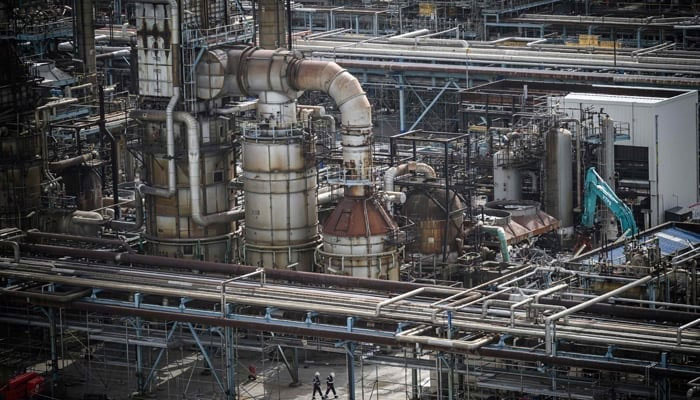$6bn refineries projects in doldrums as sales tax exemption issue remains unresolved
Exemption of sales tax on POL products has made projects to upgrade local refineries economically non-viable
ISLAMABAD: In the Finance Bill for FY26, there is no mention of resolving much-touted issue of sales tax exemption on petroleum products.
It suggests the Finance Ministry’s functionaries have failed to rectify this issue, causing a halt of $6 billion investment for upgrade projects of local refineries.
“Yes, in the FY26 Finance Bill, this issue has not been resolved”, a senior official of Petroleum Division confirmed to The News.
When contacted, Federal Minister for Petroleum and Natural Resources Ali Pervaiz Malik said, “The issue is pending with IMF, and government is awaiting response of the Fund on the issue”.
According to official sources, Managing Directors and Chief Executive Officers (CEOs) of country’s leading refineries on May 20, 2025 had met with Petroleum Minister and then with Finance Minister. During the meetings, they stressed solution of exemption of sales tax on POL products in the FY26 budget, ensuring no change in tax policy for seven years.
It would make refineries initiate investment of $6 billion on their upgrade projects to ensure petrol, diesel at par with specification of Euro-V, they said.
In the 2024 Finance Bill, FBR officials imposed sales tax exemption on POL products. The refineries, while importing crude oil, however, pay sales tax, and sales tax adjustments are not possible in the presence of this measure in the FY25 Finance Bill.
The exemption of sales tax on POL products has not only made the projects to upgrade local refineries economically unviable, it is significantly affecting project Internal Rates of Return (IRRs). It would also virtually neutralie $1.6 billion incentive package the government would extend in seven years.
However, with the endeavours of Petroleum Minister, ECC approved increase in Inland Freight Equalisation Margin (IFEM) by Rs1.87 per litre for next 12 months to cope with Rs34 billion losses refineries and oil marketing companies (OMCs) will brave till June 30, 2025 on account of sales tax exemption.
Refineries want this issue be resolved for seven years, so that $6 billion investment could be materialised in the shape of up-gradation of local refineries.
The refineries, earlier, suggested to Finance Ministry imposition of 5pc sales tax on POL products, with an impact of hike in petrol and diesel by Rs12 per litre, or restore zero rates status. But, IMF in the recent past did not agree, saying sale tax should be at 18pc percent, which would cause hike in the price of petrol and HSD each by Rs45 per litre.
The Finance Ministry had been asked by the IMF if petrol and HSD price increased by Rs45 per litre, the petroleum levy of Rs45 per litre could be reduced.
However, Finance Ministry did not buy the IMF’s argument, as revenue through PL rests with federal government, and revenue collected through sales tax would be shared with provincial governments.
-
 Daniel Radcliffe Admits To Being Self Conscious While Filming 'Harry Potter' In Late Teens
Daniel Radcliffe Admits To Being Self Conscious While Filming 'Harry Potter' In Late Teens -
 Director Beth De Araujo Alludes To Andrew's Arrest During Child Trauma Talk
Director Beth De Araujo Alludes To Andrew's Arrest During Child Trauma Talk -
 Video Of Andrew 'consoling' Eugenie Resurfaces After Release From Police Custody
Video Of Andrew 'consoling' Eugenie Resurfaces After Release From Police Custody -
 'Harry Potter' Alum Daniel Radcliffe Gushes About Unique Work Ethic Of Late Co Star Michael Gambon
'Harry Potter' Alum Daniel Radcliffe Gushes About Unique Work Ethic Of Late Co Star Michael Gambon -
 Japan: PM Takaichi Flags China ‘Coercion,’ Pledges Defence Security Overhaul
Japan: PM Takaichi Flags China ‘Coercion,’ Pledges Defence Security Overhaul -
 Angorie Rice Spills The Beans On Major Details From Season 2 Of ' The Last Thing He Told Me'
Angorie Rice Spills The Beans On Major Details From Season 2 Of ' The Last Thing He Told Me' -
 Questions Raised Over Andrew Mountbatten-Windsor's Line Of Succession
Questions Raised Over Andrew Mountbatten-Windsor's Line Of Succession -
 'Shameless' Sarah Ferguson 'pressuring' Princess Eugenie, Beatrice For Major Reason
'Shameless' Sarah Ferguson 'pressuring' Princess Eugenie, Beatrice For Major Reason -
 Teacher Arrested After Confessing To Cocaine Use During Classes
Teacher Arrested After Confessing To Cocaine Use During Classes -
 Paul McCartney Talks 'very Emotional' Footage Of Late Wife Linda In New Doc
Paul McCartney Talks 'very Emotional' Footage Of Late Wife Linda In New Doc -
 Princess Beatrice, Princess Eugenie's Response To Andrew's Arrest Revealed
Princess Beatrice, Princess Eugenie's Response To Andrew's Arrest Revealed -
 King Charles And Princess Anne Bestow Honours At Windsor Castle
King Charles And Princess Anne Bestow Honours At Windsor Castle -
 King Charles 'worried' As Buckingham Palace, Royal Family Facing 'biggest Crisis'
King Charles 'worried' As Buckingham Palace, Royal Family Facing 'biggest Crisis' -
 Milo Ventimiglia Recalls First Meeting With Arielle Kebbel On The Sets Of 'Gilmore Girls' Amid New Project
Milo Ventimiglia Recalls First Meeting With Arielle Kebbel On The Sets Of 'Gilmore Girls' Amid New Project -
 Eric Dane Infuriated After ALS Diagnosis As He Feared The Disease Would Take Him Away From His Girls
Eric Dane Infuriated After ALS Diagnosis As He Feared The Disease Would Take Him Away From His Girls -
 It's A Boy! Luke Combs, Wife Nicole Welcome Third Child
It's A Boy! Luke Combs, Wife Nicole Welcome Third Child




